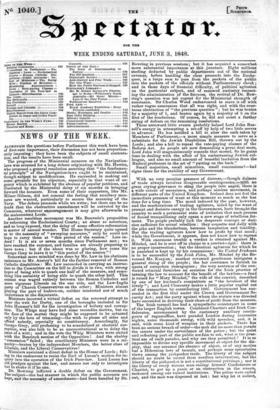NEWS OF THE WEEK.
ALTHOUGH the questions before Parliament this week have been of first-rate importance, their discussion has not been proportion- ately imposing: they have been the subjects of small contesta- tion, and the results have been small.
The progress of the Ministerial measure on the Navigation- laws was arrested for a long debate originating with Mr. Herries, who proposed a general resolution asserting that " the fundamen- tal principle" of the Navigation-laws ought to be maintained, though subject to modifications. He succeeded in making out some grounds for his objection, especially in that want of ur- gency which is exhibited by the absence of popular petitions, and illustrated by the Ministerial delay of six months in bringing forward the measure. Even some of their supporters, like Mr. Milner Gibson, did not conceal the feeling that auxiliary mea- sures are wanted, particularly to secure the manning of the Navy. The debate proceeds while we write; but there can be no doubt that the obstructive amendment will be outvoted by the Commons, whatever encouragement it may give afterwards to the malecontent Lords.
Another resultless movement was Mr. Bouverie's proposition for reforming the Ecclesiastical Courts; an abuse so notorious, and so long exposed, that the delay of some effective reformation is matter of annual wonder. The Home Secretary quite agreed as to the necessity of "sweeping measures," only he could not hope to carry them at " this period of the session." Late in- deed ! It is six or seven months since Parliament met ; we have reached the summer, and families are already preparing to leave town : but if the abuse was so glaring, how came Sir George Grey to leave it to "this period of the session " ? Somewhat more mischief was done by Mr. Law in his obstinate resistance to Mr. Anstey's bill for the further removal of Roman Catholic disabilities : Mr. Law succeeded in carrying an instruc- tion to the Committee on the bill to divide it in two, with strong hopes of being able to quash one half of the measure, and some- thing like certainty of being able to quash the other half. This contest was waged entirely between the Roman Catholics and more vigorous Liberals on the one side, and the Law-Inglis party of Church Conservatives on the other ; Ministers almost playing the part of lookers-on, neither interested nor of much importance to the disputants. Ministers incurred a virtual defeat on the renewed attempt to issue the writ for Derby, one of the boroughs included in Sir John Hanmer's bill for the investigation of bribery and corrup- tion. The Whigs may have had some recondite motive, but on the face of the matter they might be supposed to be actuated only by the love of trimming—the wish to please all sides and offend nobody, especially no constituency. Accordingly, Sir George Grey, still professing to be scandalized at electoral cor- ruption, was also loth to be so unconstitutional as to delay the issue of a writ; and in the vote the Whig Ministers were united with the Bentinck section of the Opposition I And the shabby "concession" failed ; the conciliatory Ministers were in a mi- nority—beaten by the independent Members, the better class of Liberals, and the Liberal Conservatives !
Ministers sustained a direct defeat in the House of Lords ; fail- ing in the endeavour to resist the Earl of Lucan's motion for in- quiry into the operation of the Irish Poor-law. Lord Lucan has old grudges against the law, and means not only to investigate but to shake it if he can.
Dr. Bowring inflicted a double defeat on the Government. The subject—the bad manner in which the public accounts are kept, and the necessity of amendment—had been handled by Dr.
Bowring in previous sessions ; but it has acquired a somewhat more substantial importance at this juncture. Eight millions sterling deducted by public departments out of the national revenue, before handing the clear proceeds into the Exche- quer, is a large sum to pass from the pockets of the public into the pockets of the officials without Parliamentary check ; and in these days of financial difficulty, of political agitation on the particular subject, and of renewed curiosity respect- ing the administration of the finances, the revival of Dr. Bow- ring's question was too cogent for the Ministerial strength of resistance. Sir Charles Wood endeavoured to stave it off with rather vague assurances that all was right, and with the cour- teous obstruction of "the previous question "; but he was beaten by a majority of 1, and beaten again by a majority of 5 on the first of the resolutions. Of course, he did not court a further string of defeats on the remaining resolutions.
These untoward little events probably helped Lord John Rus- sell's energy in attempting a set-off by help of two little moves in advance. He has notified a bill to alter the oath taken by Members of Parliament,—a more simple measure to serve as a substitute for the Jewish Disabilities Bill, thrown out by the Lords ; and also a bill to repeal the rate-paying clauses of the Reform Act. As people are now demanding a great deal more, Lord John will magnanimously concede that morsel. So he gains time in dealing with the affair of his embarrassing Jewish col- league, and also no small amount of boastful laudation from the Radical professors in the art of " patting on the back."
Small majorities, small minorities, small concessions !—bad signs these for the stability of any Government.


























